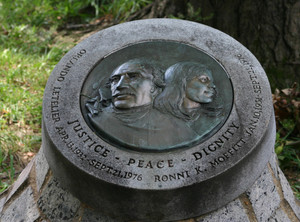Note: Our accounts contain the personal recollections and opinions of the individual interviewed. The views expressed should not be considered official statements of the U.S. government or the Association for Diplomatic Studies and Training. ADST conducts oral history interviews with retired U.S. diplomats, and uses their accounts to form narratives around specific events or concepts, in order to further the study of American diplomatic history and provide the historical perspective of those directly involved.
After Augusto Pinochet led a coup d'état in Chile on September 11, 1973, taking power from the democratically elected President Salvador Allende, he exiled Allende's Foreign Minister, Orlando Letelier. After Letelier sought asylum in the United States, Pinochet believed he was acting as an informant to the U.S. government. Consequently, he was targeted by the Pinochet regime and assassinated by a car bomb, along with his American assistant, Ronni Moffitt, in Sheridan Circle in Washington, D.C. on September 21, 1976. 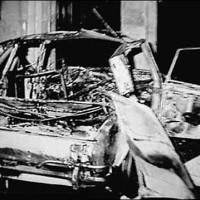 At the time, the U.S. government blatantly denied having any intelligence that could have prevented the assassination. Recently released documents reveal incriminating evidence that contradicts this. A cable declassified in April 2010 reveals that a démarche protesting Pinochet's Operation Condor assassination program was proposed and sent on August 23, 1976 to U.S. embassies in Uruguay, Argentina, and Chile to be delivered to their host governments; however, this was later rescinded on September, 16, 1976 by Kissinger, following concerns raised by the U.S. ambassadors assigned there of both personal safety and a likely diplomatic blowback. The assassination took place five days later.
At the time, the U.S. government blatantly denied having any intelligence that could have prevented the assassination. Recently released documents reveal incriminating evidence that contradicts this. A cable declassified in April 2010 reveals that a démarche protesting Pinochet's Operation Condor assassination program was proposed and sent on August 23, 1976 to U.S. embassies in Uruguay, Argentina, and Chile to be delivered to their host governments; however, this was later rescinded on September, 16, 1976 by Kissinger, following concerns raised by the U.S. ambassadors assigned there of both personal safety and a likely diplomatic blowback. The assassination took place five days later.
This account was compiled from an interview by ADST in 1991 with George W. Landau, Ambassador to Paraguay from 1972-77 and Ambassador to Chile from 1977-82. You can read the entire account on ADST.org.
LANDAU: It happened in the summer of 1976. The Paraguayans put a man in jail as a communist. Unfortunately the fellow was also reportedly connected with the Agency [CIA] he was also reportedly connected with the Inter-American Foundation [an independent agency of the United States government that funds development projects undertaken by grassroots groups and nongovernmental organizations in Latin America and the Caribbean]. I really hit a brick wall trying to get him out -- I talked to President Stroessner who said, "He is a real dangerous communist and if, in fact he is connected with the Agency, it shows how little sense the Agency had in taking him on."
Q: The man was a Paraguayan?
LANDAU: Yes, a Paraguayan. Of course the Agency never confirmed or denied that he was connected to it. I pointed out that he was connected to the Inter-American Foundation which did not impress Stroessner one way or another. It festered in the U.S. Government and finally the Deputy Director of the Agency, my old friend [Vernon] Dick Walters, came down. Dick Walters with his usual great diplomatic skills was able to convince President Stroessner to let the fellow go, which happened. The man who was particularly influential in getting all of this done, particularly in getting Dick Walters in and out of Paraguay without anybody knowing it, was the personal secretary of President Stroessner, Conrado Pappalardo.
About a month after all of this happened, Pappalardo came to see me and said that President Stroessner had received a phone call from President Pinochet telling him that there were serious irregularities in the Codelco Corporation in New York, which is the Chilean copper state agency that handles millions and millions of dollars every month in copper sales to the United States and elsewhere.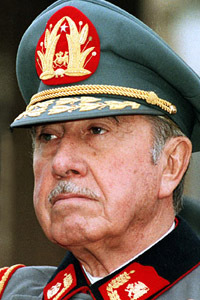 Pinochet wanted to send two officials to look into these irregularities, but of course it had to be done clandestinely. They were in Paraguay and Pappalardo wanted me to give them a visa.I said, "Thank you for telling me, but I cannot give them visas because you have just told me that you want a visa for Chileans, and you also told me, if I did not misunderstand, that you were giving them Paraguayan passports, or are they coming on Chilean passports? If they are coming on Chilean passports I have no problem, but if they are coming on Paraguayan passports I cannot give them a visa."
Pinochet wanted to send two officials to look into these irregularities, but of course it had to be done clandestinely. They were in Paraguay and Pappalardo wanted me to give them a visa.I said, "Thank you for telling me, but I cannot give them visas because you have just told me that you want a visa for Chileans, and you also told me, if I did not misunderstand, that you were giving them Paraguayan passports, or are they coming on Chilean passports? If they are coming on Chilean passports I have no problem, but if they are coming on Paraguayan passports I cannot give them a visa."
He said, "No, they are coming on Paraguayan passports to really make it deep cover."
I said, "No, that is just not possible."
He came the next day and said, "I am just telling you as a friend, if you don't give me the visas now, I can send passports over to the consulate any day with a diplomatic note and the Consul will give them to them under normal diplomatic regulations and the Consul will never know who they are. I am just tipping you off that these fellows are coming and if you have any problems with them you can watch them over there."
I had to make a decision on this and I decided to give them visas, which was obviously in violation of regulations. Of course, I don't give visas, the Consul does and I did not want to get him in trouble so I gave him written instructions to give visas to those people, but he did not know the details. But as a precaution, since I did not trust the Paraguayans or anyone else, I made photostats of the applications and photostats of the pictures and sent them to Washington. In fact all this took several days to go back and forth.
The two Chileans were sufficiently alarmed and figured that something was up and took their passports and returned to Chile, they never used the visas.
Q: You had said you had informed the Department...
LANDAU: ...And the Agency because one of the points that Pappalardo had said was that he had instructed those two fellows to see Pappalardo's friend General Walters. I sent this message and I got a message back from the head of CIA who had just taken over, George Bush.
He had absolutely no interest in this and did not want to be involved. I then sent a note to the Paraguayan government saying that the visas were of no value because the Department had informed me that on entry into port they would be arrested anyway and I would like to have the passports returned. They were returned about six weeks later without the photos -- the photos were ripped out. But I had them and had sent them in....
Well, as it happened, we learned later on, the two fellows went back to Chile, smelled a rat and never used the Paraguayan passports, but they were concerned about what they had done.So they sent two officers, who had absolutely nothing to do with the case, under the same names they had given me, on Chilean passports, to go to the United States and stay two weeks and to come back. They had no purpose, other than, if anybody checked on this they will find the names there. However, what the Chileans did not know was that we had the photos.
We knew the people who went under those names were not the people who were in Paraguay. The people who were in Paraguay went under different Chilean passports to the United States, they were [Michael] Townley, an American, and Fernandez Larios, a Chilean army officer (at left), and they then engineered the killing of Orlando Letelier. When I say engineered it, they did not actually kill him physically, but Townley contracted the Cubans. 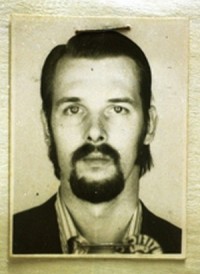 Of course I had no idea when we heard that Letelier was killed that it had anything to do with those fellows. The names were different; there was absolutely no reference.
Of course I had no idea when we heard that Letelier was killed that it had anything to do with those fellows. The names were different; there was absolutely no reference.
The FBI and the Department of Justice started to put two and two together by matching the photos of the Paraguayan passports which I sent in with Chilean passports who had the same pictures, but totally different names because Townley and Fernandez Larios went under different names than originally given. So eventually that helped to identify them, and eventually the Department of Justice in 1978 and 1979 sent the extradition requests for Townley and Fernandez Larios to me.
The really key point was that we wanted the American, Townley, who we thought was the main perpetrator. Not the brain, because the brain was obviously the Chief of the Chilean secret police (DINA), General Contreras. So I asked for Townley as an American. I talked to the Foreign Minister and he said, "Well, we don't know where he is." I said, "Look at today's papers, it says he is here and there."
He said, "That is all nonsense, he is not here." I pressed very hard. In fact after a number of discussions with the Foreign Minister ... they just handed Townley (at right) over to us. He was an American, he was not extradited, they just drove him from the hotel to the airport. They called me up in the morning and said they were going to give me Townley; he was in prison.
I called the FBI agents who were there. They went to the airport, they picked up Townley and off they went to the United States. Townley, of course, broke the whole story. He still lives in the United States under the federal witness immunity program and lives happily ever after. [He was convicted of murder and served 62 months in prison.]
We have tracked down the people who were the physical assassins of Letelier, the Cubans, Townley and the others. The intellectual perpetrators, General Contreras and Colonel Espinosa were put in jail when the extradition request came through, but after one year they were released after the Supreme Court refused extradition.
We then urged the Chileans to have a local trial. The president of the Supreme Court told me that this would be the outcome, but then President Pinochet did not like that either and was able to convince the Supreme Court not to have a local trial.
They have just selected a new justice in Chile to renew the case and look into it again and to see what next should be done. The only next step that should be taken is that Contreras and Colonel Espinosa should be tried for being the intellectual perpetrators of this crime. This has not happened yet, but I think it will happen. [On November 12, 1993, a Chilean court sentenced Contreras to seven years in prison for the Letelier assassination. He is currently serving 25 sentences totaling 289 years in prison for kidnapping, forced disappearance and assassination.]But I must say that if it were not for the fact that as a safeguard, I photographed the two people, Townley and Fernandez Larios, who came to Paraguay, the case could never have been broken. At least we had the photos. It shows that it pays off to be extra careful sometimes and still take the chance of doing it....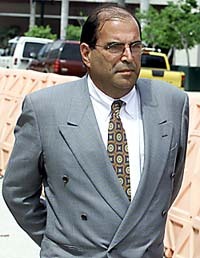 Nobody would have ever found out. But Pappalardo tipped me off, by giving me a cock and bull story about Codelco corporation but had he not said anything to me and just sent them over under a diplomatic note I would have never known about it and the Consul would have given them visas as he gives every day to five or ten people who are on official travel on official Paraguayan passports.... Of course, the government certifies this.
Nobody would have ever found out. But Pappalardo tipped me off, by giving me a cock and bull story about Codelco corporation but had he not said anything to me and just sent them over under a diplomatic note I would have never known about it and the Consul would have given them visas as he gives every day to five or ten people who are on official travel on official Paraguayan passports.... Of course, the government certifies this.
But he (Pappalardo), whether it was just because of a loose tongue or whether he really wanted to tip us off, you never know.

